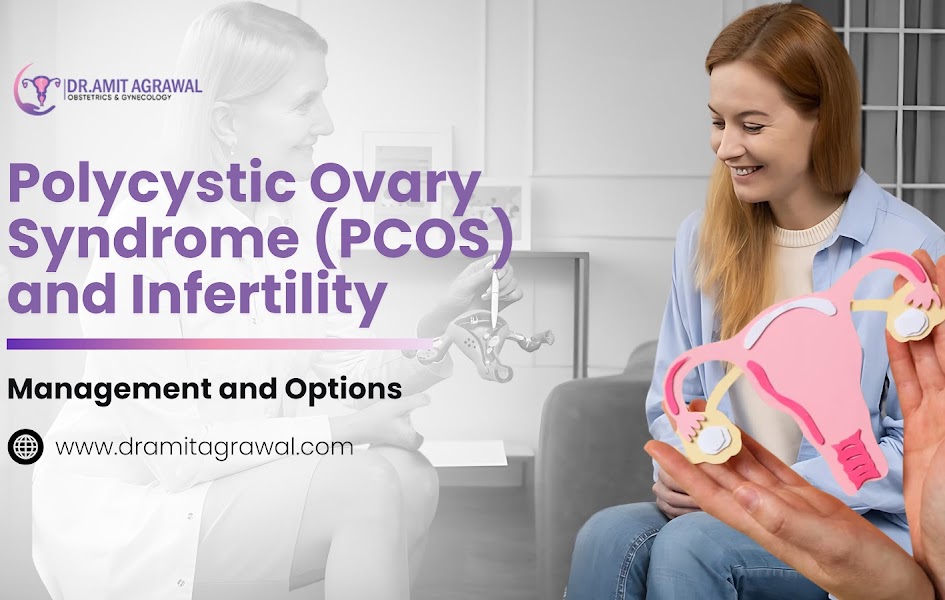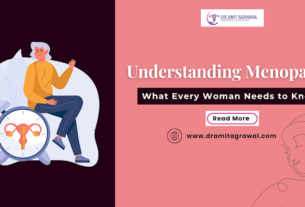Polycystic Ovary Syndrome (PCOS) is one of the most common hormonal disorders affecting women of reproductive age. It is often associated with irregular menstrual cycles, excessive androgen levels, and polycystic ovaries. One of the most distressing concerns for women with PCOS is infertility. However, with the right medical guidance and lifestyle changes, managing PCOS and improving fertility is possible. Dr. Amit Agrawal at Swastik Clinic, Vashi, Navi Mumbai, specializes in the diagnosis and management of PCOS, offering tailored treatment plans to help women achieve better reproductive health.
Understanding PCOS and Its Impact on Fertility
PCOS affects fertility primarily due to hormonal imbalances that disrupt ovulation. Women with PCOS often experience:
- Irregular Periods: This is due to inconsistent ovulation or anovulation (lack of ovulation), making it difficult to conceive.
- Insulin Resistance: Many women with PCOS have insulin resistance, which can contribute to weight gain and further hormonal imbalances.
- Increased Androgen Levels: Higher levels of male hormones can cause symptoms like acne, excess hair growth, and difficulty in egg maturation.
- Ovarian Cysts: While the term “polycystic” suggests multiple cysts, these are actually small follicles that fail to mature and release an egg.
Managing PCOS for Better Fertility
While there is no cure for PCOS, several strategies can help manage symptoms and improve fertility:
1. Lifestyle Modifications
- Healthy Diet: A balanced diet rich in whole grains, lean proteins, healthy fats, and low in refined sugars can help regulate blood sugar levels and support hormone balance.
- Regular Exercise: Physical activity improves insulin sensitivity, aids in weight management, and helps restore normal menstrual cycles.
- Weight Management: Even a 5-10% reduction in body weight can significantly improve ovulation and increase the chances of conception.
2. Medical Treatments
- Ovulation Induction Medications: Drugs like Clomiphene Citrate or Letrozole are commonly prescribed to stimulate ovulation.
- Insulin-Sensitizing Agents: Metformin is often used to improve insulin resistance and regulate menstrual cycles.
- Hormonal Therapy: Birth control pills may be prescribed to regulate menstrual cycles and lower androgen levels.
3. Advanced Fertility Treatments
For women who do not respond to initial treatments, assisted reproductive technologies (ART) may be considered:
- Intrauterine Insemination (IUI): A procedure where sperm is directly placed into the uterus to enhance the chances of fertilization.
- In Vitro Fertilization (IVF): IVF is recommended in cases where other treatments fail, offering a higher success rate by fertilizing eggs outside the body and implanting them into the uterus.
4. Holistic Approaches
- Stress Management: Chronic stress can worsen PCOS symptoms. Practices like yoga, meditation, and mindfulness can help manage stress levels.
- Acupuncture and Herbal Remedies: Some women find relief with alternative therapies, although medical consultation is advised before trying them.
Seeking the Right Care
If you are struggling with PCOS-related infertility, consulting a specialist can make a significant difference. Dr. Amit Agrawal at Swastik Clinic, Vashi, Navi Mumbai, provides comprehensive PCOS management, helping women navigate their fertility journey with expert guidance and personalized treatment options.
📍 Visit us at:
Swastik Clinic, B2-17, Opposite Duttaguru Society, Sector 15, Vashi, Navi Mumbai
📞 Call Us: +91 8850461614 | +91 9437163294
📧 Email: dramit19@yahoo.com




